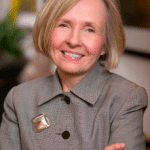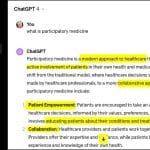Guest post by SPM member Katherine Kelly Leon @KatherineKLeon of the famous “SCAD sisters,” spotlighted in this 2011 post. This is about the “Your Googling” mug many of us discussed last week.

Source: http://www.catholicvote.org/caffeinated-graces-or-why-giving-up-coffee-is-a-very-very-bad-idea/
Coffee mugs are like totems, spiritual items that empower us. Many of us have a favorite mug that helps us feel strong enough to conquer the day ahead. Some of us may have several favorites, and choose a mug to suit our mood or daily agenda.
In this way, a coffee mug serves as a personal “traffic advisory” sign, which is why the Google mug image has struck such a nerve among patient activists. From the angry patient perspective, the physicians getting a chuckle out of this mug are essentially giving an invisible middle finger to patients who hope to manage their own health, control personal medical care costs, and live well. To me, the joke is less about Google search results than it is some doctors’ perceptions about patient behavior. What a hoot that patients would spend time and energy online researching our symptoms rather than go to the experts and do what we’re told, right?
The flood of comments on Facebook generated by the TheEmergencyMedicineDoctor post, as well as those on e-Patients.net and elsewhere, have covered vital reasons why empowered patients have it right, and the docs got it wrong this time. But we patients should acknowledge hubris is a dangerous dance. I’ve listened to doctors tell me “it’s nothing” after I experienced alarming symptoms and then I nearly died of a heart attack. Yet, I’ve thought my son had MRSA when he merely experienced an allergic reaction to new soap.
Maybe the whole collaborative, mutually empowering doctor-patient relationship movement would go better if we acknowledge that no one likes authority shoved in his or her face. Whether professional credentials stamped on a cheap mug or reams of scientific journal data, human nature makes us recoil when we encounter authority in “our” personal bubble. Such scenarios come off as a threat unless we handle ourselves with respect and compassion for each other.
So let’s come together over the good news that coffee isn’t killing us after all, and pour another cup – in a much nicer mug.
Patient advocate Katherine Leon is a survivor of a heart attack caused by a spontaneous coronary artery dissection (SCAD). She is co-founder and chairperson of the nonprofit advocacy organization SCAD Alliance.






Great post, thank you!
You wrote ” But we patients should acknowledge hubris is a dangerous dance. I’ve listened to doctors tell me “it’s nothing” after I experienced alarming symptoms and then I nearly died of a heart attack. Yet, I’ve thought my son had MRSA when he merely experienced an allergic reaction to new soap.”
In life only facts count. The effect of the errors made on each side are wildly different. In the case of medical errors by the experts you almost died and as many statistics show many people people die every year. In the case of you, the caregiver, making an error of opinion was very stressful but that’s about it since you were not the one treating your son for MRSA. I see one of the greatest values of activated e-patients as being able to assess what the experts are recommending in one particular case, since e-patients knows either themselves or their loved one better than anybody else.
Great doctors know their authority comes from their intrinsic value and have no problem saying either “I don’t know” or “your opinion matters”. Just run away from any doctor who doesn’t respect your opinion, because after all has been said and done you still know your body better than anyone else and you must be part of the decision.
Agree! Plus, in a world where online learning and MOOCs have become an accepted means of higher education, it only makes sense that patients use every possible means to supplement our self-care and improve interactions with the health care system — whether doctor, nurse, benefits coordinator … (I appreciate the way you expanded the MRSA example, much clearer, thanks!)